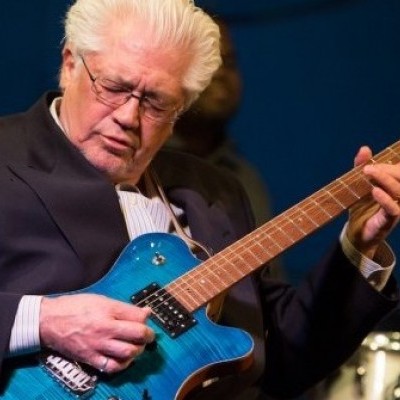
Larry Coryell performs at The Jazz Kitchen in Indianapolis on May 23, 2015.
He subsequently joined the Gary Burton Quartet and made more musical history in April 1967 by playing on Duster, another seminal jazz-rock album. His debut as a leader came the following year, with the Vanguard LP Lady Coryell, where he’s joined by Moses, Jimmy Garrison (bass) and Elvin Jones (drums).
Coryell participated in yet another landmark recording with his 1970 album Spaces, which featured an all-star cast of John McLaughlin, Chick Corea, Miroslav Vitous and Billy Cobham, well before the formation of Weather Report, Return To Forever or the Mahavishnu Orchestra.
At the time of DownBeat’s post-election phone call to Coryell in Orlando, he was busy working on a piano reduction for his next opera, an adaptation of Leo Tolstoy’s Anna Karenina. His first opera, based on Tolstoy’s War and Peace, received its world premiere in Slovenia in 2013 and was staged in Russia in 2014, with help from the U.S. Embassy there. “It went over huge in Russia,” he said. “The audience went absolutely crazy. And it was also a good diplomatic exercise in showing how through love of music and culture you can have a dialogue between what are ostensibly enemies.”
The world premiere for Coryell’s Anna Karenina will take place in May. Plans are already in place to stage his third opera, Ulysses, based on the James Joyce novel, in Dublin, Ireland, on June 16, 2018, which is officially Bloomsday, an annual commemoration and celebration of the life of the Irish author.
“Fortunately, I obtained from one of his family members while in Ireland a ‘companion book’ telling how to read the original, in terms of what he means or may mean,” Coryell said. “So, I am slowly extracting content from the book and converting it to music.”
Opera, it turns out, is a relatively recent passion for the godfather of fusion guitar. The seed was planted several years ago when he first heard Barney Kessel’s 1959 Contemporary album Carmen, on which the great guitarist adapted pieces from the Georges Bizet opera. But it wasn’t until 2010, when Coryell encountered a series of Maria Callas performances on German TV, via YouTube, that the opera bug bit hard. “I was enamored by these videos of Callas,” he said. “She had a tone like Ben Webster … it was so deep, just unbelievable. She had to sit through eight or nine minutes of the overture, but when she started to sing, she was truly transfigured. And it reminded me of when I saw Wes play. When you see a genius like a Wes Montgomery or a Maria Callas, they have this look when they’re in the heat of battle. It’s the look of eagles, and I saw it on her.”
Between the Eleventh House reunion, the solo project and his immersion into opera, Coryell was thriving artistically through the first half of 2016. But all his forward momentum came to a crashing halt for a period of three months—from June to August.
“On June 2, I had a sinus operation that went wrong,” he explained. “The doctor went into my brain by accident with the laser. So I had brain damage. My family—especially my wife—freaked out. It caused unbelievable emotional stress for them. And for one month I was just unresponsive. My wife brought me home and did all these antibiotic drips on me. We had to do this day and night, and it wore her out. I don’t remember everything, but at one point Tracey told me, ‘You almost died twice.’ When you have something like that happen to you and then you come back from it, you have a tremendous appreciation for your life.”
So how did Coryell make it through this dark period?
“Nam-myoho-renge-kyo, baby,” he said with chuckle, reciting the Buddhist mantra. “All the members in Orlando chanted for me when I couldn’t chant for myself. It took me three months, but I came back. Now I’m back 100 percent and I think I’m playing better.”
Coryell’s attempt to regain the muscle memory in his hands was an arduous process that involved endless hours of practicing on his instrument at home. “I couldn’t play,” he recalled. “I was so incapacitated, I had no coordination. It was scary. In the beginning, I would take a nylon-string guitar and go into the bathroom, where there would be more reverb, and I would just play Bach—this one lute prelude that I learned in my first guitar lesson way back in New York in the fall of 1965. At first, I just sounded awful. Nothing was working. I had to work long and hard to get the muscle memory back.”
Throughout the month of August, Coryell continued his intensive woodshedding process at his brother Jim’s house in Chicago. “I practiced and practiced on a black Cort guitar, a Larry Coryell signature model I had given him. Whenever I go to Chicago, I just borrow my brother’s guitar. I shedded a ton on that axe.”